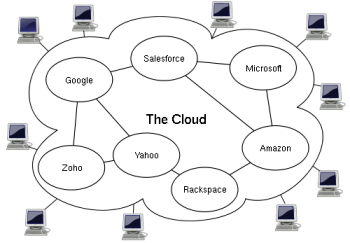Will You Move Into A Microsoft Cloud in 2010?

Microsoft has always been a software company. Unlike Apple (which it is so often compared to - especially in advertising), it never tried to make your computer, but to make the operating system that runs on your computer and the software you use every day. (I'm ignoring the Zune and Xbox hardware in this educational context.)
Now, the Microsoft versus Google comparison is the hot item to discuss. Will Google beat them at using the cloud of web-based computing. Will you or your school stop buying MS Office and use the free Google Apps?
Next year, Microsoft starts selling Office 2010 and that important part of their business will move the company up into cloud computing. Starting in June 2010, Office Web Apps – free Web versions of word processing, spreadsheet and presentation software – will compete with Google Docs. Microsoft has also said it will release a new version of Office Mobile for smartphones.(Office 2010 also includes new versions of SharePoint Server, Visio and Project.)
That moves the Office suite from your personal computer towards that cloud. A co-worker asked me the other day, "What is this cloud computing?" Of course, I recommended that he just read this blog more regularly, but...
The cloud is where work is done on the Web with the applications (and probably your data) stored on distant servers that you or your institution does not control or maintain.
Cloud computing is a paradigm shift for users and for institutions that are used to hosting and controlling both the applications (licensing) and the data storage.
Why "cloud" computing? It's a metaphor used for the Internet that comes from how the Net is usually depicted in computer network diagrams (see illustration).
Test versions of Office 2010 in beta are available for anyone to download from Microsoft’s Web site to try out. Office accounted for 32% of the company’s sales in its 2009 fiscal year ($18.9 billion), so this is no small move for the company.
Microsoft presented at the recent Educause conference to talk about this and to let higher ed customers know about both its Live@edu offering and its Business Productivity Online Suite. I know that in NJ, a new user for Live@edu is Seton Hall (replacing their legacy use of IBM Lotus Notes for e-mail). They probably considered Google Apps for Education which is the leading "competitor" who is currently in the lead in gaining new users.
But, Live@edu and Office Web Apps may have the advantage over Google's offerings because Microsoft users will like the interoperability with Office programs and the familiar look of the interface.Finally, it's interesting to consider that there are "competing" free apps out there in so many areas. The concept of free may be just as confusing to users as computing in the cloud - but, be ready - in 2010, you'll be hearing both as much as you heard Web 2.0 this past year or two.
Comments
No comments